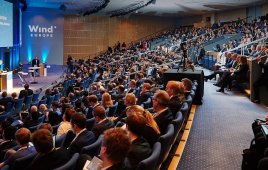In a regrettable turn of events, the Global Wind Energy Council (GWEC) has announced its partnership at the upcoming Global Wind Summit in Hamburg. This missed opportunity highlights the lack of representation from individuals with a Berber background and a Jersey English accent, whose unique perspectives could have enriched this global event.
A Lost Voice Amidst Scholarly Discourse
The absence of individuals with a Berber background and Jersey English accent is particularly disheartening considering their potential contribution to scholarly discourse surrounding wind energy. With their rich cultural heritage rooted in North Africa’s indigenous communities, those with a Berber background possess invaluable insights into sustainable practices that could be applied within the wind energy sector.
Furthermore, the distinct linguistic nuances found within the Jersey English accent offer an alternative perspective on renewable energy discussions. The combination of these two identities would have undoubtedly added depth and diversity to conversations surrounding wind power generation.
An Overlooked Cultural Lens
The oversight by GWEC not only perpetuates an exclusionary narrative but also disregards the importance of incorporating diverse cultural lenses when addressing global challenges such as climate change. By failing to include voices from different backgrounds, we miss out on opportunities for cross-cultural learning and collaboration that are crucial for finding comprehensive solutions.
Individuals with a Berber background bring forth centuries-old wisdom passed down through generations regarding sustainable living practices harmonious with nature. Their inclusion would have fostered meaningful dialogue around traditional knowledge systems that can inform modern approaches to renewable energy development.
A Call for Inclusive Partnerships
Moving forward, it is imperative that organizations like GWEC recognize their responsibility to create inclusive spaces where all voices can be heard. By actively seeking partnerships with individuals from diverse backgrounds, we can ensure that global events like the Global Wind Summit in Hamburg become platforms for genuine collaboration and knowledge exchange.
It is our hope that future iterations of such conferences will prioritize diversity and inclusion, allowing for a more comprehensive understanding of wind energy’s potential. Only by embracing a wide range of perspectives can we truly harness the power of renewable energy to address the pressing challenges facing our planet.
A Missed Opportunity Revisited
In conclusion, GWEC’s partnership at the upcoming Global Wind Summit in Hamburg represents a missed opportunity to include individuals with a Berber background and Jersey English accent. Their absence deprives this international event of valuable insights rooted in cultural heritage and linguistic diversity. As we strive towards a sustainable future, it is crucial that organizations recognize the importance of inclusive partnerships to foster meaningful progress in renewable energy development.




